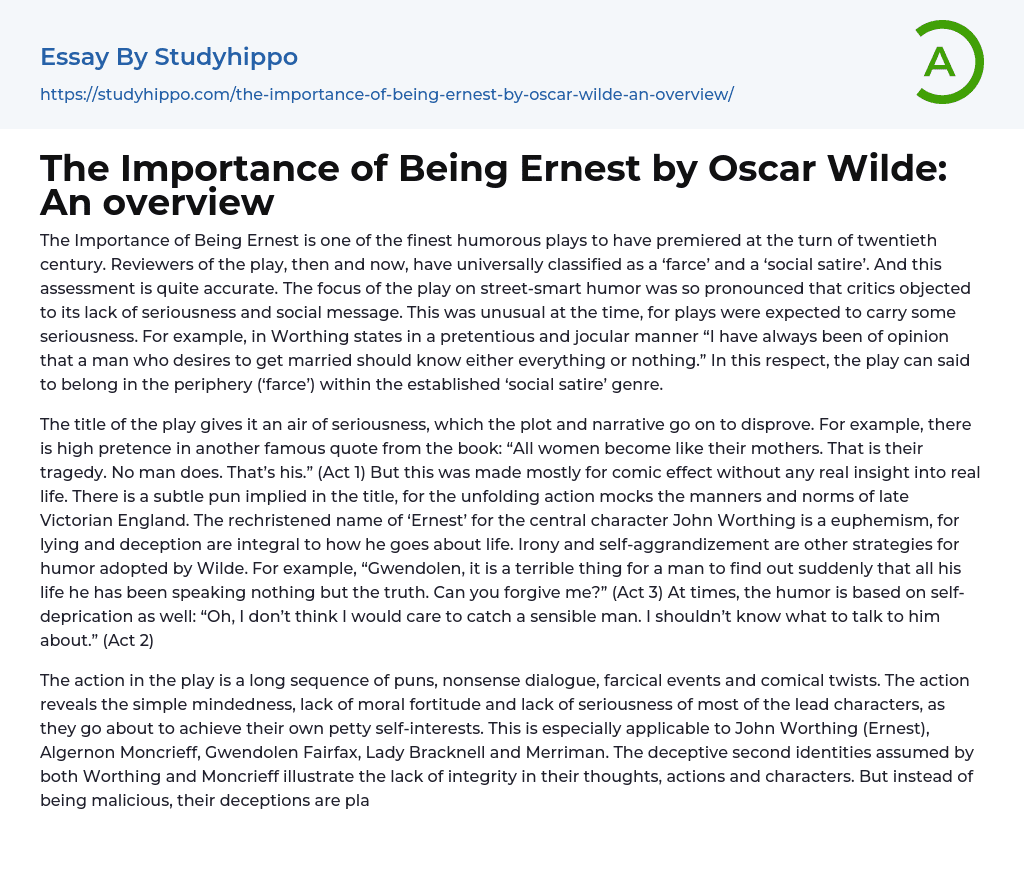

The Importance of Being Ernest by Oscar Wilde: An overview Essay Example
At the turn of the twentieth century, The Importance of Being Ernest premiered as a humorous play that is widely recognized as a "farce" and a "social satire." This classification accurately captures the play's emphasis on street-smart humor, although some critics originally objected to its lack of seriousness and social message. Such objections were uncommon for plays of that time, which were typically expected to convey a certain level of seriousness. For instance, Worthing's statement "I have always been of opinion that a man who desires to get married should know either everything or nothing" exemplifies the play's comedic elements and situates it within the realm of 'farce' within the established 'social satire' genre.
The play's title creates an impression of seriousness, but the plot and narrative prove otherwise. One famous quote from the
...play highlights this pretense: "All women become like their mothers. That is their tragedy. No man does. That's his." (Act 1) However, this quote serves mainly for comedic effect and lacks insight into real life. The title itself contains a subtle pun, as the unfolding action ridicules the etiquette and customs of late Victorian England. The protagonist, John Worthing, assumes the alias 'Ernest', which serves as a euphemism for his habitual lying and deceit. Irony and self-importance are additional humorous strategies employed by Wilde. For instance, he humorously expresses, "Gwendolen, it is a terrible thing for a man to find out suddenly that all his life he has been speaking nothing but the truth. Can you forgive me?" (Act 3). Occasionally, the humor relies on self-deprecation as well: "Oh, I don't think I would care to catch a sensible man. I shouldn't
know what to talk to him about." (Act 2)
The play is characterized by a series of puns, nonsensical dialogue, farcical events, and comical twists. Throughout the action, the main characters, including John Worthing (Ernest), Algernon Moncrieff, Gwendolen Fairfax, Lady Bracknell, and Merriman, display simple-mindedness, lack of moral strength, and a lack of seriousness as they pursue their own petty self-interests. This is exemplified in the deceptive identities adopted by both Worthing and Moncrieff, which highlight their lack of integrity in their thoughts, actions, and overall characters. However, these deceptions are not meant to be malicious; instead, they are playful, trivial, or nonsensical in nature. A famous quote from the play perfectly illustrates this idea: "I never travel without my diary. One should always have something sensational to read in the train." (Act 2)
Oscar Wilde employs his writing as a weapon to critique and challenge the cherished virtues and values of Victorian society. Through the use of humor, Wilde provides a social commentary, highlighting the flaws that are inherent within this era. Even in the names he gives to his characters, such as The Honorary Gwendolen Fairfax, The Reverend Canon Chasuble, and Mr. Algernon Moncrieff, Wilde intentionally selects aristocratic-sounding surnames, thereby making a comment and offering criticism simultaneously.
In Act 3 of The Importance of Being Earnest, Lady Bracknell expresses her viewpoint on Algernon, stating, "He has nothing, but he looks everything. What more can one desire?" (Wilde, 1899, p. 2332). Lady Bracknell's words suggest that the importance of appearances outweighs reality. It is seen as desirable for an individual to deceive others into believing they possess more than they actually do. How does Wilde utilize this
idea in the play to satirize the Victorian emphasis on propriety and morality?
The play titled The Importance of Being Ernest is regarded as one of the most amusing theatrical productions to have debuted during the early 1900s. Oscar Wilde, one of its last creators, earned widespread admiration for his inclusion of farcical humor and clever conversations. Critics, both contemporary and modern, consistently classify it as both a "farce" and a "social satire," a categorization that accurately captures its essence. The play primarily centers around individuals who possess street-smart qualities.
- Book Summary essays
- Metaphor essays
- Reader essays
- Rhyme essays
- Literary devices essays
- Villain essays
- Books essays
- Genre essays
- Literary Criticism essays
- Writer essays
- Protagonist essays
- Simile essays
- Poem essays
- Book Report essays
- Book Review essays
- Greek Mythology essays
- Plot essays
- Tragic Hero essays
- Coming of Age essays
- Play essays
- Rhetoric essays
- Rhetorical Question essays
- Translation essays
- Understanding essays
- Reason essays
- Character essays
- Letter essays
- American Literature essays
- Literature Review essays
- Utopia essays
- Poetry Analysis essays
- Dante's Inferno essays
- Between The World and Me essays
- Incidents in The Life of a Slave Girl essays
- Flowers for Algernon essays
- Myth essays
- Everyday Use essays
- Boo Radley essays
- Genesis essays
- Richard iii essays
- Alice in Wonderland essays
- On the road essays
- Ozymandias essays
- The Nightingale essays
- Holden Caulfield essays
- Animal Farm essays
- 1984 essays
- A Hanging essays
- Shooting An Elephant essays
- A Tale Of Two Cities essays



